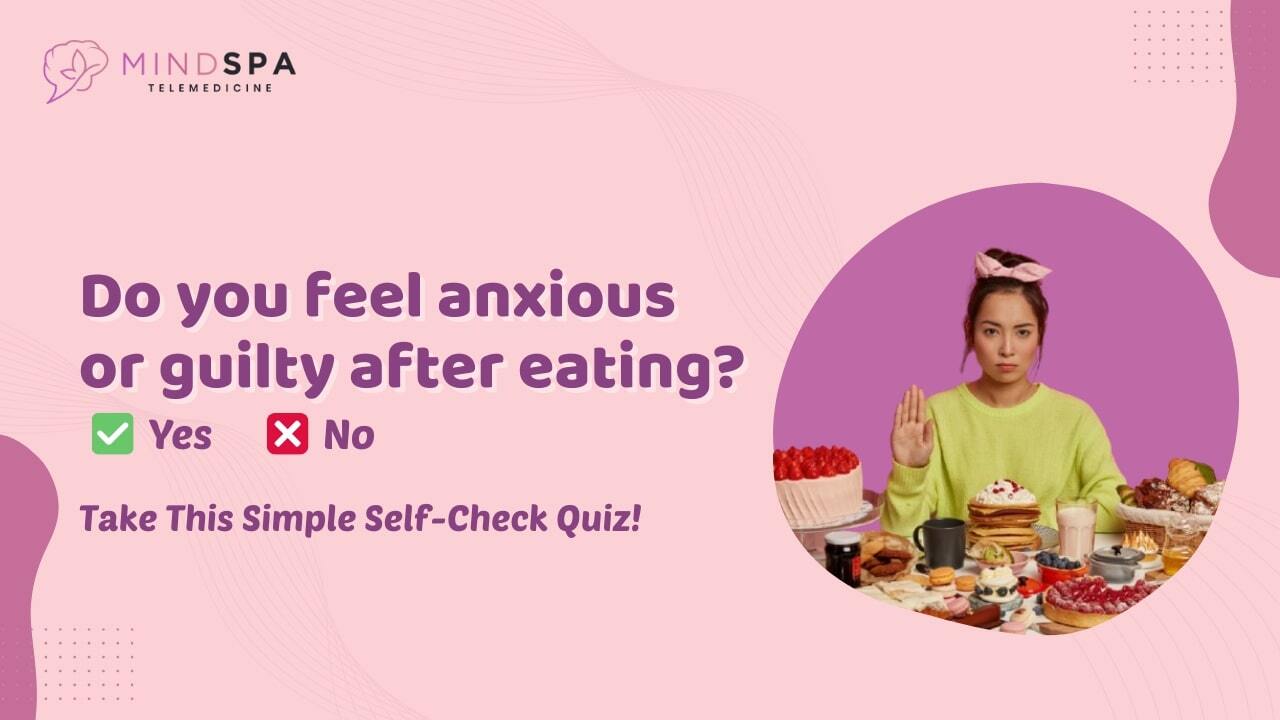Eating disorders affect millions of people worldwide, yet many individuals struggle to recognize the signs in themselves. Eating disorders are serious mental and physical health conditions that can significantly impact a person’s well-being.
Common types include anorexia nervosa, bulimia nervosa, binge-eating disorder, and avoidant/restrictive food intake disorder (ARFID). Eating disorders often result from a combination of genetic, psychological, and environmental factors, making early intervention important for effective treatment and recovery.
If you have concerns about your eating habits or relationship with food, this article will present some self-check quizzes to help you gain insight. While this quiz is not a diagnostic tool, it can help determine whether you should seek professional support.
Understanding Eating Disorders
Eating disorders are complex mental health conditions that involve persistent disturbances in eating behaviors, thoughts, and emotions. They are not just about food but often stem from deeper psychological struggles, including anxiety, depression, and low self-esteem. Early detection and intervention are crucial to preventing long-term health complications. The most common types include:
- Anorexia Nervosa: Characterized by an intense fear of gaining weight, severe restriction of food intake, and a distorted body image.
- Bulimia Nervosa: Involves cycles of binge eating followed by purging behaviors, such as vomiting or excessive exercise.
- Binge Eating Disorder: Defined by frequent episodes of uncontrollable eating, often leading to guilt and distress.
- Other Specified Feeding or Eating Disorders (OSFED): Includes various eating disorders that don’t meet the strict criteria of the above but still cause significant distress.
Recognizing the signs early can lead to better treatment outcomes.
Self-Check Quiz: Do You Have an Eating Disorder?
Answer the following questions honestly:
- Do you frequently think about food, calories, or dieting?
- Do you feel anxious or guilty after eating?
- Are you preoccupied with your body weight or shape?
- Do you avoid social events because of food concerns?
- Do you skip meals to lose weight, even when hungry?
- Do you eat large amounts of food in one sitting, feeling out of control?
- Do you eat in secret due to shame or embarrassment?
- Have you experienced significant weight loss or gain within a short period?
- Do you feel tired, dizzy, or weak often?
- Have you noticed hair thinning, dry skin, or irregular menstrual cycles?
- Do you feel isolated or withdrawn due to concerns about food or weight?
If you answered “yes” to multiple questions, it may indicate an unhealthy relationship with food. Even if you don’t meet the criteria for a full eating disorder, disordered eating patterns can still impact your mental and physical health.

Causes, Symptoms, and Prevention
Below, we look at the causes, symptoms, and prevention.
Causes
Eating disorders arise from a combination of factors:
- Biological Factors: Genetic predisposition, hormonal imbalances, and neurotransmitter dysfunction.
- Psychological Factors: Low self-esteem, perfectionism, anxiety, depression, and obsessive-compulsive tendencies.
- Environmental Factors: Societal pressure for thinness, childhood trauma, family dynamics, and cultural influences.
- Social Media Influence: Unrealistic beauty standards promoted by digital platforms can contribute to body dissatisfaction and disordered eating behaviors.
Symptoms
The symptoms of eating disorders vary depending on the specific condition but often include:
- Physical Symptoms: Extreme weight loss or gain, irregular menstrual cycles, dizziness, gastrointestinal issues, dry skin, and brittle nails.
- Behavioral Symptoms include skipping meals, excessive calorie counting, eating large quantities of food quickly (binge eating), purging behaviors (vomiting, excessive exercise, or laxative use), and avoiding certain foods.
- Psychological Symptoms: Intense fear of gaining weight, body dysmorphia, extreme preoccupation with food and dieting, feelings of guilt or shame after eating, and social withdrawal.
Prevention
Preventing eating disorders involves promoting a healthy relationship with food and body image, particularly among young people. Strategies include:
- Encouraging Healthy Eating Habits: Teaching balanced nutrition rather than promoting restrictive dieting.
- Building Positive Body Image: Fostering self-acceptance and challenging unrealistic beauty standards.
- Reducing Media Influence: Limiting exposure to harmful social media content and promoting body diversity.
- Recognizing Early Warning Signs: Identifying and addressing disordered eating behaviors before they escalate.
- Creating a Supportive Environment: Parents, educators, and peers can be critical in reinforcing healthy attitudes toward food and self-worth.

Steps to Recovery
Overcoming an eating disorder takes time, patience, and professional guidance. Here are some important steps in the recovery process:
- Acknowledging the Problem – Recognizing that you have an issue is the first step toward recovery.
- Seeking Professional Help – Working with specialists, such as therapists and dietitians, can provide structured support.
- Challenging Negative Thoughts – Learning to identify and reframe unhealthy food and body image beliefs.
- Developing a Healthy Eating Plan – Working with a nutritionist to create balanced meals that support well-being.
- Building a Support System – Engaging with friends, family, or support groups for encouragement.
- Practicing Self-Compassion – Understanding that recovery is a journey and setbacks do not define failure.

Why Seeking Help Is Important
Many people with eating disorders struggle in silence due to fear, stigma, or the belief that their condition isn’t “serious enough.” However, early intervention is crucial in preventing long-term health complications. Untreated eating disorders can lead to severe health risks, including malnutrition, heart complications, digestive issues, and mental health deterioration. The sooner you seek professional support, the better your chances of recovery. Professional support may include:
- Psychotherapy: Cognitive-behavioral therapy (CBT), dialectical behavior therapy (DBT), or other forms of counseling can help address underlying emotional triggers.
- Nutritional Counseling: A registered dietitian can help develop a balanced eating plan that promotes health and healing.
- Medical Support: A healthcare provider can assess and manage any physical complications associated with an eating disorder.
- Support Groups: Connecting with others who share similar experiences can provide encouragement and motivation for recovery.
Conclusion
Eating disorders are serious but treatable conditions. Acknowledging the problem is the first step to recovery. By taking this quiz and reaching out for professional help, you are prioritizing your well-being. Early intervention can make all the difference in your recovery journey. Visit MindSpa to learn more about eating disorders and mental health and take the first step toward a healthier relationship with food and yourself.
Frequently Asked Questions
How does an eating disorder begin?
Several precipitating factors, which include behaviors like exercise or dieting or stressors like loss, trauma, or illness, can trigger the start of the disorder. When an eating disorder begins, it is usually sustained by perpetuating factors that add to its maintenance.
What does a body check eating disorder mean?
Body-checking behaviors refer to intense and repeated scrutiny of the body. Often, individuals compare themselves to others in real life, repeatedly check their appearance in the mirror, research ways to improve the body or think about the body a lot.


